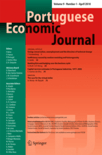
Portuguese Economic Journal
Scope & Guideline
Fostering Global Perspectives in Economic Research
Introduction
Aims and Scopes
- Macroeconomic Analysis:
The journal regularly publishes studies that examine macroeconomic indicators, policies, and their impacts on national economies, particularly in Portugal and other regions. This includes analyses of inflation, growth rates, and monetary policy effects. - Financial Development and Markets:
Research in this area explores the relationship between financial markets and economic growth, including studies on stock markets, debt, and the role of financial institutions in economic stability. - International Economics and Trade:
The journal addresses issues related to international trade dynamics, currency fluctuations, and the effects of geopolitical events on economies, with a focus on emerging markets and their integration into the global economy. - Environmental Economics:
Recent publications indicate a growing emphasis on the intersection of economic activities and environmental sustainability. This includes studies on climate change impacts, resource allocation, and policy recommendations for sustainable development. - Tourism and Economic Growth:
Given the significance of tourism in many economies, including Portugal, the journal frequently examines the relationship between tourism development and economic growth, addressing challenges and opportunities within this sector. - Quantitative and Empirical Methods:
The Portuguese Economic Journal employs a variety of quantitative methodologies, including stochastic frontier analysis, econometric modeling, and machine learning techniques, to analyze economic data and derive insights.
Trending and Emerging
- Impact of Global Crises on Economies:
Recent publications have increasingly examined the effects of global crises, such as the COVID-19 pandemic and geopolitical conflicts, on economic performance and stability, highlighting the journal's responsiveness to current events. - Digital Economy and Fintech:
There is a growing focus on the implications of digital transformation and fintech innovations on economic models, financial markets, and consumer behavior, reflecting a broader trend towards digitalization in the economy. - Sustainable Development and Climate Economics:
The journal is increasingly addressing the economic implications of climate change and the pursuit of sustainability, with research exploring the interplay between economic policies and environmental outcomes. - Data-Driven Economic Analysis:
The incorporation of advanced data analytics, machine learning, and statistical techniques in economic research has become more prominent, indicating a trend towards leveraging big data for economic insights. - Macroeconomic Policy Responses to Economic Shocks:
There is a noticeable trend towards analyzing the effectiveness of macroeconomic policies in response to economic shocks, including fiscal and monetary interventions, reflecting the ongoing challenges faced by policymakers.
Declining or Waning
- Traditional Labor Economics:
Research focused on traditional labor market issues, such as unemployment and wage dynamics, has seen a decrease. This may suggest a shift towards more contemporary issues, such as the gig economy and its implications for labor. - Static Economic Models:
There appears to be a waning interest in static economic models that do not account for dynamic changes in the economy. The journal has increasingly favored dynamic models that incorporate time-varying elements and real-world complexities. - Regional Economics:
While regional economic studies were once a staple, there has been a noticeable reduction in papers focusing solely on regional disparities within Portugal or Europe, possibly due to a broader focus on global economic interactions. - Behavioral Economics:
Although behavioral economics has gained traction in various economic journals, its representation in the Portuguese Economic Journal has diminished, indicating a possible shift back towards more traditional economic theories.
Similar Journals
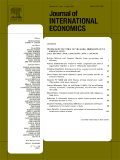
JOURNAL OF INTERNATIONAL ECONOMICS
Transforming understanding of the global economic landscape.JOURNAL OF INTERNATIONAL ECONOMICS, published by ELSEVIER, stands at the forefront of advancing knowledge in the fields of economics and finance. With an esteemed Q1 ranking in both Economics and Econometrics and Finance categories, this journal has established itself as a premier platform for disseminating innovative research. Since its inception in 1971, the journal has provided critical insights into the dynamics of international economic interactions, making it essential reading for researchers, professionals, and students seeking to understand complex global economic issues. With access to high-quality, peer-reviewed articles, readers can stay abreast of the latest trends, methodologies, and empirical findings shaping the economic landscape. Based in the Netherlands, the journal continues to attract contributions from leading experts worldwide, with its rigorous selection process ensuring that only the most impactful research is published, further enhancing its significance in the academic community.
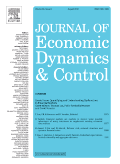
JOURNAL OF ECONOMIC DYNAMICS & CONTROL
Pioneering Research for Dynamic Systems and Control ExcellenceJOURNAL OF ECONOMIC DYNAMICS & CONTROL, published by Elsevier, is a distinguished scholarly journal that has established itself as a leading outlet in the fields of applied mathematics, control and optimization, and economics and econometrics since its inception in 1979. With its notable Q1 categorization in 2023 across these disciplines, this journal provides a platform for innovative research that propels theory and practice in dynamic systems and control processes. Researchers, professionals, and students can engage with cutting-edge studies that explore complex economic models and their real-world applications. Although the journal does not offer open access, it remains a vital resource for those aiming to stay informed of the latest advancements in economic dynamics and control methodologies. The journal’s commitment to high-quality research and its impressive standing—ranked in the top percentiles within Scopus categories—underscore its importance and influence within the academic community.
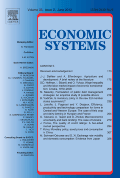
Economic Systems
Illuminating the future of economics and econometrics.Economic Systems is a premier academic journal published by Elsevier, specializing in the dynamic field of economics and econometrics. With an ISSN of 0939-3625 and E-ISSN 1878-5433, this journal is known for its rigorous peer-reviewed articles that delve into economic theory, policy analysis, and empirical research, making it an invaluable resource for researchers, professionals, and students alike. Based in the Netherlands, the journal has established a strong reputation, evidenced by its Q2 ranking in Economics and Econometrics and a commendable position within the 74th percentile of its category in Scopus rankings. Covering a breadth of topics relevant to contemporary economic systems, from their structural assessments to real-world applications, Economic Systems aims to inform and advance the discourse within the field. While it operates under a subscription model, the journal ensures accessibility to groundbreaking research, encouraging a deeper understanding of the economic challenges facing today’s societies.
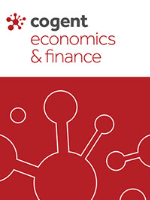
Cogent Economics & Finance
Empowering scholars with open access to innovative finance studies.Cogent Economics & Finance is a prominent open-access journal published by Taylor & Francis AS, catering to the dynamic fields of economics, econometrics, and finance. With an ISSN of 2332-2039, this journal aims to foster interdisciplinary dialogue and disseminate cutting-edge research from 2013 onwards. Hailing from the United Kingdom and featuring open access since its inception, it provides a platform for researchers, practitioners, and students to access high-quality scholarly articles without barriers. Currently categorized in the Q3 quartile for both Economics & Econometrics and Finance as of 2023, Cogent Economics & Finance remains vital for advancing knowledge in these areas, evidenced by its respectable Scopus rankings—310 out of 716 in Economics and Econometrics and 143 out of 317 in Finance. Its scope encompasses innovative research methodologies and policy implications, making it a significant resource for those on the cutting edge of economic and financial studies. Join us in exploring the critical aspects of this evolving field through our richly detailed articles, which support the academic community in addressing contemporary challenges and opportunities.
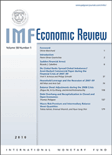
IMF Economic Review
Fostering Deeper Insights into Economic Theories and PracticesIMF Economic Review, published by Palgrave Macmillan Ltd, stands as a preeminent journal in the fields of Economics and Business Management, holding a prestigious Q1 ranking in both categories as of 2023. With an ISSN of 2041-4161 and an E-ISSN of 2041-417X, this journal not only showcases high-quality, peer-reviewed research but also embraces the principles of Open Access, promoting wide dissemination of its findings to researchers, professionals, and students alike. Spanning significant years from 2010 to 2024, the IMF Economic Review features innovative analyses and insights that challenge conventional economic paradigms and foster deeper understanding of global economic dynamics. Its impressive Scopus ranking places it in the top 10% of economics journals globally, affirming its vital role in advancing academic discourse and practical application in economics and finance. For those dedicated to exploring the intricacies of economic theory and practice, the IMF Economic Review is an invaluable resource that not only informs but also inspires.
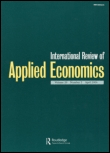
International Review of Applied Economics
Exploring the Frontiers of Applied EconomicsInternational Review of Applied Economics is a leading journal dedicated to the dissemination of innovative research in the fields of economics and econometrics. Published by Routledge Journals, a renowned name in academic publishing under Taylor & Francis Ltd., this journal has established itself as a key resource for scholars, practitioners, and decision-makers. With an impressive Q2 ranking in the category of Economics and Econometrics, and positioned in the 70th percentile based on Scopus rankings, it provides a platform for high-quality, peer-reviewed articles that address contemporary economic issues. The journal aims to facilitate the understanding of applied economic theory and practice, and it accepts a diverse range of contributions including empirical studies, theoretical analyses, and methodological advancements. Operating from the United Kingdom, it has been a significant contributor to the academic dialogue since its inception in 1987, fostering knowledge exchange through rigorous scholarship. Researchers, professionals, and students alike will find valuable insights that inform policy-making and economic strategy in its pages.
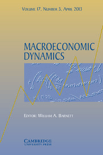
MACROECONOMIC DYNAMICS
Illuminating the Path of Economic DynamicsMACROECONOMIC DYNAMICS, a distinguished academic journal published by Cambridge University Press, serves as a pivotal platform for innovative research in the fields of economics and econometrics. With its ISSN 1365-1005 and E-ISSN 1469-8056, the journal has been at the forefront of scholarly communication since its inception in 1997, offering an extensive range of articles that explore dynamic economic models, policy impacts, and theoretical advancements through the latest empirical analyses. Currently holding a Q2 ranking within the 2023 Economics and Econometrics category, and positioned at rank #409 out of 716 within Scopus, it is an essential resource for researchers, professionals, and students alike, looking to stay updated on critical developments in macroeconomic theory and practice. Although it follows a traditional subscription model rather than Open Access, the journal continually strives to disseminate high-quality, peer-reviewed content that informs and inspires the global economics community. The importance of MACROECONOMIC DYNAMICS lies in its commitment to fostering a deeper understanding of economic phenomena, making it a must-read for anyone engaged in the complexities of the economic landscape.

Istanbul Iktisat Dergisi-Istanbul Journal of Economics
Connecting Research and Policy for Economic ProgressIstanbul Iktisat Dergisi-Istanbul Journal of Economics, published by ISTANBUL UNIVERSITY, is a prominent journal that serves as a platform for innovative and thought-provoking research in the field of economics. As an Open Access journal since 2010, it aims to enhance the dissemination of knowledge by providing free access to high-quality research outputs, ensuring that scholars and practitioners around the globe can engage with the latest findings. The journal covers a wide range of economic topics, fostering interdisciplinary dialogue and contributing to both academic discourse and practical applications in economic policy. With a commitment to excellence, the journal seeks to attract submissions from both established and emerging researchers, offering insights that are vital for understanding the complexities of economic systems. With its ISSN 2602-4152 and E-ISSN 2602-3954, the Istanbul Journal of Economics stands out as an essential resource in the economics field, fostering meaningful research contributions and collaborations.

B E Journal of Macroeconomics
Illuminating contemporary issues in macroeconomic theory.B E Journal of Macroeconomics is a distinguished academic journal published by WALTER DE GRUYTER GMBH that serves as a critical platform for advancing the field of macroeconomic research. Established in 2001, it has gained recognition within the economics community, featuring a broad range of theories and empirical studies relevant to contemporary economic issues. With an impact factor reflective of its academic contributions, the journal is categorized in the Q3 quartile for Economics and Econometrics, ranking 607 out of 716 in its field according to Scopus metrics. The journal's scope includes a comprehensive exploration of macroeconomic trends, policy analysis, and the dynamics of economic systems, catering to researchers, practitioners, and students alike. Though primarily published in a traditional format, researchers have ample opportunities to access its invaluable content through institutional subscriptions, ensuring the dissemination of knowledge across the global economic landscape. Located in Berlin, Germany, B E Journal of Macroeconomics not only enriches the academic discourse but also fosters a deeper understanding of macroeconomic phenomena, making it an essential resource for anyone engaged in the field.
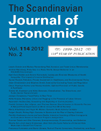
SCANDINAVIAN JOURNAL OF ECONOMICS
Connecting Scholars and Practitioners WorldwideSCANDINAVIAN JOURNAL OF ECONOMICS (ISSN: 0347-0520, E-ISSN: 1467-9442), published by Wiley, stands as a pivotal platform for disseminating research in the fields of economics and econometrics. With an impressive Q1 ranking in both disciplines, this journal plays a critical role in advancing theoretical and applied economic research, catering to an international audience of scholars, practitioners, and students. Its coverage from 1977 to 2024 demonstrates a robust commitment to publishing high-quality research that influences both policy-making and academic inquiry. Although it operates on a traditional subscription model, the journal remains accessible to a broad readership, which is essential for fostering knowledge sharing within the economics community. As such, the SCANDINAVIAN JOURNAL OF ECONOMICS is an essential resource for those seeking to explore the latest developments and methodologies in economic research, helping to bridge practical insights with academic rigor.